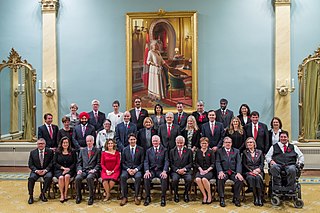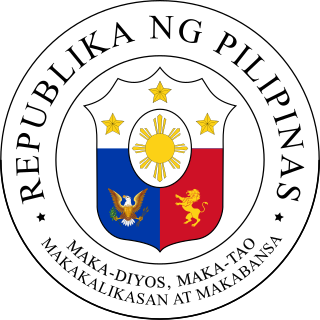This is a list of female cabinet ministers of Israel .
Numerical order represents the order of first appointment to the cabinet.
Age represents age on appointment to that office.
This is a list of female cabinet ministers of Israel .
Numerical order represents the order of first appointment to the cabinet.
Age represents age on appointment to that office.

A prime minister or chief of cabinet is the head of the cabinet and the leader of the ministers in the executive branch of government, often in a parliamentary or semi-presidential system. A prime minister is not the head of state, but rather the head of government, serving as the chief of the executive under either a monarch or a president in a republican form of government.

The prime minister of Japan is the head of government of Japan. The prime minister chairs the Cabinet of Japan and has the ability to select and dismiss its ministers of state. The prime minister also serves as the commander-in-chief of the Japan Self Defence Forces and is a sitting member of either house of the National Diet.

The Israeli system of government is based on parliamentary democracy. The Prime Minister of Israel is the head of government and leader of a multi-party system. Executive power is exercised by the government. Legislative power is vested in the Knesset. The Judiciary is independent of the executive and the legislature. The political system of the State of Israel and its main principles are set out in 11 Basic Laws. Israel does not have a written constitution.

The Senate of Canada is the upper house of the Parliament of Canada. Together with the Crown and the House of Commons, they compose the bicameral legislature of Canada.

The prime minister of Belgium or the premier of Belgium is the head of the federal government of Belgium, and the most powerful person in Belgian politics.

The Cabinet of Canada is a body of ministers of the Crown that, along with the Canadian monarch, and within the tenets of the Westminster system, forms the government of Canada. Chaired by the prime minister, the Cabinet is a committee of the King's Privy Council for Canada and the senior echelon of the Ministry, the membership of the Cabinet and Ministry often being co-terminal; as of November 2015 there were no members of the latter who were not also members of the former.

The Cabinet of Japan is the chief executive body of the government of Japan. It consists of the prime minister, who is appointed by the Emperor after being nominated by the National Diet, in addition to up to nineteen other members, called ministers of state. The current cabinet is Second Ishiba Cabinet, which was formed on 11 November 2024, is led by the prime minister Shigeru Ishiba. The country has had a Liberal Democratic–Komeito coalition cabinet since 2024.

Ellen Louks Fairclough was a Canadian politician. A Progressive Conservative member of the House of Commons of Canada from 1950 to 1963, she was the first woman ever to serve in the Canadian Cabinet.

Penelope Ying-Yen Wong is an Australian politician who is serving as the minister for Foreign Affairs and leader of the Government in the Senate in the Albanese government since 2022. A member of the Australian Labor Party (ALP), she has been a senator for South Australia since 2002. Wong previously served as minister for Climate Change and minister for Finance and Deregulation during the governments of Prime Ministers Kevin Rudd and Julia Gillard from 2007 until 2013.

The Cabinet of the Philippines consists of the heads of the largest part of the executive branch of the national government of the Philippines. Currently, it includes the secretaries of 22 executive departments and the heads of other several other minor agencies and offices that are subordinate to the president of the Philippines.

Yukhym Leonidovych Zvyahilsky was a Ukrainian politician.

The prime minister of Tunisia is the head of the executive branch of the government of Tunisia. The prime minister directs the executive branch along with the president and, together with the prime minister's cabinet, is accountable to the Assembly of the Representatives of the People, to the prime minister's political party and, ultimately, to the electorate for the policies and actions of the executive and the legislature.

The Twenty-Eighth Canadian Ministry was the Cabinet, chaired by Prime Minister Stephen Harper, that governed Canada from the beginning of the 39th Parliament to the end of the 41st Parliament. Its original members were sworn into the Queen's Privy Council for Canada on February 6, 2006, exactly two weeks after the 2006 federal election and nine weeks and six days after the end of the 38th Canadian Parliament. Smaller than its recent predecessors, the Conservative Cabinet originally consisted of 27 members, including the Prime Minister. On January 4, 2007, five Secretaries of State were added to the ministry who are not members of the Cabinet itself. The cabinet resigned on the morning of November 4, 2015.

Grace Naledi Mandisa Pandor is a South African politician, educator and academic who served as the Minister of International Relations and Cooperation until 2024. She also served as a Member of Parliament (MP) for the African National Congress (ANC) from 1994 to 2024.

The attorney general of Israel heads the legal system of the executive branch and the public prosecution of the state. The attorney general advises the government in legal matters, represents the state authorities in court, advises in the preparation of legal memoranda for the government in general and the justice minister in particular. Likewise they examine and advise upon private member's bills in the Knesset.
Since the founding of the State of Israel, relatively few women have served in the Israeli government, and fewer still have served in the leading ministerial offices. While Israel is one of a small number of countries where a woman—Golda Meir—has served as Prime Minister, it is behind most Western countries in the representation of women in both the parliament and government.

Edgars Rinkēvičs is a Latvian public official and politician serving as the 11th and current president of Latvia since July 2023. He previously served as the minister of foreign affairs of Latvia from 2011 to 2023, and head of the Chancery of the President of Latvia as state secretary of the Ministry of Defence, as well as a deputy of the Saeima.